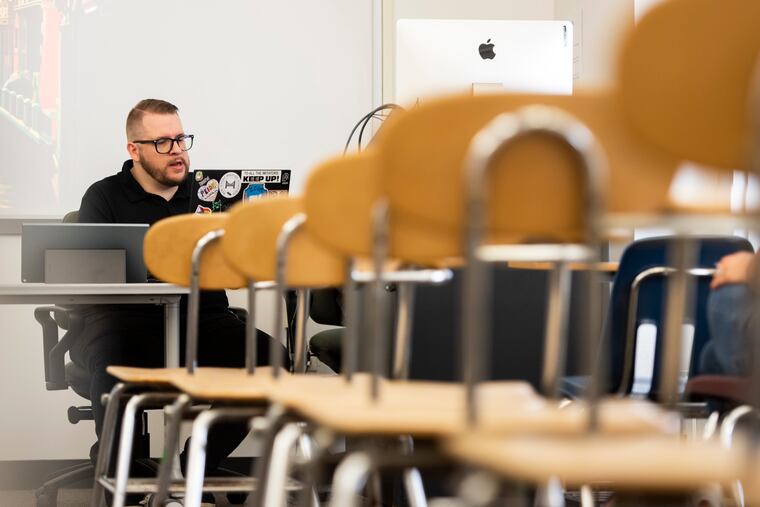How summer class is different for a UArts adjunct, who is also helping negotiate his union’s first contract
Bradley Philbert is on the negotiating committee for the UArts faculty union, which has been bargaining a first contract for over two years, while teaching a summer course on money and economics.

My Summer Job is a weekly series that explores the jobs of seasonal workers in Philadelphia. Each week, we’ll share stories from a typical day in the life of the people who make summer happen in the region.
On paper, Bradley Philbert’s job during the summer doesn’t seem much different from the rest of the year.
During the fall and spring academic semesters, the adjunct professor teaches multiple classes at three universities in Pennsylvania and New Jersey. In the summer, he tries to take it easy, teaching just one course at the University of the Arts.
But Philbert’s five-week money and economics class, in the School of Critical Studies, is no summer breeze. Cramming a syllabus that usually takes 15 weeks into just over a month means meeting via video for 80 minutes, three times a week.
With such frequent face time, it can start to take on a “summer camp” vibe, Philbert said. “That’s something to, I think, enjoy rather than work against,” he said, so he shapes classes around discussion rather than lecturing.
“What is money, to you?” Philbert said, kicking off a class period. Over Zoom, students vocalized their insights and feelings, while Philbert wove in examples from the course reading materials.
Throughout the summer, Philbert is also maintaining a freelance writing business and helping negotiate a first contract for the faculty union at UArts, of which he is a member, during a pivotal point in bargaining.
The Inquirer spent an afternoon with Philbert as he facilitated the online course and participated in a union meeting and learned how the summer class is simultaneously a whirlwind and a relief from the typical academic setting.
Why summer is different
Teaching in the summer differs from the rest of the year in two key ways, Philbert said: The pace is faster, and the setting changes. One week, he’ll be at a friend’s house in Long Beach Island. Another week he’ll be at a collective bargaining conference in Washington, teaching from a hotel room.
And on days when the union is at the bargaining table, including an entire week of July, he’ll be in negotiations at the university’s Center City campus from 9 a.m. to 5 p.m., just popping out for the hour-and-a-half of class on Monday, Wednesday, and Thursday.
“It’s definitely the full-remote-work lifestyle of jumping around,” he said. “I couldn’t do what I wanted to do in the summer if I had to teach in-person.”
Students, too, are often completing their schoolwork in a different setting during the summer, he added. They coordinate with Philbert so they can take class from their vacation spot or between shifts at their own summer jobs.
“These are organized arts workers, these are real people whose lives don’t stop when they log onto the Zoom,” Philbert said. ”In the summer I get to see even more like what students’ real lives are like. It helps me be a better teacher.”
Where teaching and organizing meet
The main reason Philbert is teaching at UArts this summer is to keep the door open for future summer teaching opportunities. By doing well this summer, he said, he will be more likely to be offered summer classes in future years.
The money is a consideration, too — it’s less than he would make from multiple classes, but “a good holdover” for the summer. “Otherwise I have to make sure that I bank a significant amount of my paycheck” during the regular school year, he said.
He’s not alone in that. During bargaining sessions, most of the faculty members sitting at the table “have some kind of summer gig work,” he said. Their time spent bargaining is unpaid, he noted.
“It used to be ‘Nobody gets rich by teaching,’ but a lot of people can’t even get a stable single-income house,” Philbert said. “If my partner didn’t also own their home and work full-time, this would not be a viable career path in any city, and Philly is relatively less expensive to live in.”
The UArts faculty negotiations have gone on for 28 months; on average a first contract for a new union takes a little over 15 months to negotiate. Major issues in negotiations, he said, are job security, wages and health care.
A university spokesperson said meetings with the faculty union have been productive throughout the summer. “Together, we have made encouraging progress on a host of issues, and the university is optimistic that our negotiations will reach a successful conclusion soon,” the spokesperson said.
With that deadline in mind, this summer is “obviously freighted with a lot of significance,” Philbert said. “It does feel like there’s kind of like that light at the end of the tunnel.”
Philbert ends up talking about organizing a good bit during his summer class, which aims to help the student artists feel confident in economic discussions so they can manage a career as an entrepreneur. Students want to know what contracts look like for performing artists, expecting that they may join a union when they start working.
“The students are just really, really eager to figure out what this is like,” Philbert said. “They don’t need any convincing that in creative industries and as an art educator, you gotta organize for power.”